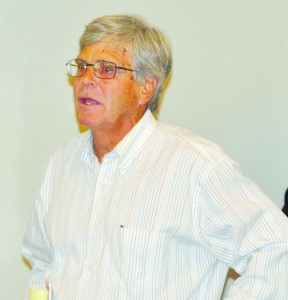Uproar over Dividing Up Youth Jobs Money
Mar 22, 2013
Posted in Oakland Job Programs
By Ken A. Epstein
A proposed decision on how to divide up federal job money for youth for the next two years is stirring charges that nonprofits that provide services to Latinos and young people in West Oakland are excluded and that the decision favors the bigger, better-funded agencies.
“When do you show fairness?” asked Ron Muhammad, a West Oakland activist, who said his community has not received federal
youth job money for the past two years.
“Year after year, you always deny us, a whole district. We can’t go on and not get anything,” and Latinos in the Fruitvale District are not getting anything either, he said.
Based on an application and interviews conducted by a three-member panel of the Youth Council of the Oakland Workforce Investment Board (WIB), the Youth Council and the WIB Executive Committee approved a decision at their meetings on Wednesday to give money for 2013-2015 to five groups that provide year-round job training for youth:
Youth Radio, which is requesting $208,980; CivicCorps, asking for $275,000; Lao Family, $300,000; Youth Employment Partnership (YEP), $300,000; and Youth UpRising, $300,000.
The decision still must be voted upon by the full WIB board and the City Council. The actual amount that each organization will receive must still be negotiated and depends on the new federal budget. The services that the groups will deliver also remain to be negotiated.
Groups that were not funded were First Place for Youth, asking for $294,899; GRIP/Pivotal Point, $300,000, a small nonprofit that serves youth mostly in West Oakland; and Spanish Speaking Citizens Foundation, $299,997, which serves Latino and immigrant youth in the Fruitvale District.
Several speakers said that neighborhood and turf differences mean that many young people will not travel between West and East Oakland to participate in a program.
“There are real lines and different cultures between West and East Oakland. If we have a (police) crime plan that addresses West Oakland, we should have a youth job plan that addresses West Oakland,” said Marlon McWilson, member of the Alameda County Board of Education.
The Latino population in East Oakland is large and growing, and it is not being served, he said.
Henry Rosales, executive director of Spanish Speaking Citizens Foundation, criticized the board for failing to reverse years of underserving Latino youth.
“Our organization has been in the Fruitvale for 40 years. I’ve been on the Youth Council for seven years now. It’s never been addressed in my opinion,” he said.
“I …hear we are sensitive, (but) it’s not good enough. This is a systemic problem. Speaking on behalf of the Latino community, it’s insulting that (this) continues to go on when this group has the power to do something about it.”
Peter Roos, attorney and board chair of the Foundation, said the decision on dividing the money could be open to legal challenge.
He said he had heard that all the interviewees and presenters were given the questions in advance, but the Speaking Speaking Citizen’s Foundation speaker never received the questions.
It was said during a Youth Council meeting, he said, that the same questions were asked in the interviews with each agency that was presenting. “Everybody was given the same questions, so there would be parity,” Roos said he had heard.
One of the questions was, “What language skills does your staff have?”

“Nobody ever asked us that question,” Roos said. “If that is true, Spanish Speaking had its feet shackled during (the) race,” he said.
Three agencies were denied funding, not because they were not qualified, but because of a lack of sufficient federal money to serve everyone, said Al Auletta, Development/Redevelopment program manager in the City Manager’s office.
“In the ideal world we would be able to touch every neighborhood and every target group. But in the real world we have very limited funds,” he said.
Questions were raised at the meetings about why funding was limited to five agencies, not all eight.
“We had a fixed target of five organizations” to fund, said Gay Plair Cobb, WIB board member and CEO of the Oakland Private Industry Council. “Is there any reason why five was the magic number?” she asked.
Auletta said the decision was based on how much federal money the city was likely to receive.
For many years, Cobb said, “Latino youth have been underserved in both year-round and summer programs.” In addition, some Latino youth speak indigenous languages, not Spanish. “Who’s gong to be interacting with them?” she asked.
Others asked why the five agencies receiving funding had not been required to partner with smaller agencies. Several WIB board members said that possibility would be considered. “Small agencies do not just need partners. They need the financial resources to do their work,” Cobb said.
Additionally, speakers complained that only 25 percent of the scoring on the application was based on the written application. Seventy-five percent was based on the oral presentation.
“I’m very uncomfortable (supporting the decision) when so much weight is put on the presentation and interview,” said Frank Tucker, WIB member and CEO of Tucker Technology, adding that the process put the “small guys … at a disadvantage.”
“Are the (funded) providers equipped to serve the Spanish speaking community?” Tucker asked. As the proposed decision stands, it “would alienate a major portion of the youth community we are attempting to serve,” he said.
Rosales of Spanish Speaking Citizens Foundation said he previously had seen indications that funding decisions would not take into account the needs of specific communities but would end up favoring larger, better-funded nonprofits.
“We’re seeing it play out here,” he said.